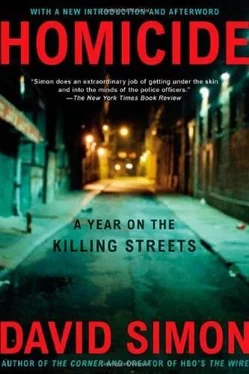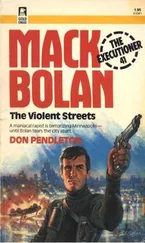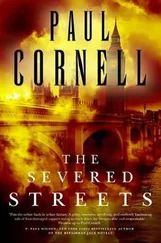Landsman and Dick Fahlteich, the primary detective for the riot, have those suspects brought to the deputy warden’s office. They come in one by one, shackled and cuffed and devoid of expression. A quick survey reveals that every last one is a product of Baltimore, and all but four are down on a city murder charge. In fact, every other name on the list manages to trigger a memory in some detective’s mind. Clarence Mouzone? That crazy bastard beat three or four murders before Willis finally got him on one. Wyman Ushery? Didn’t he kill that boy at the Crown station on Charles Street back in ’81? Litzinger’s case, I think. Fuck yeah, that was him.
The accused shuffle into the office and listen impassively as Landsman tells them they were seen assaulting this or that guard. Each inmate listens with practiced boredom, glancing back and forth among the faces of the detectives, searching for anything that seems familiar. You can almost hear them thinking aloud: That one I don’t remember, but that one was there for my lineup, and that one in the corner took the stand on me in court.
“You want to say anything?” asks Landsman.
“I don’t got shit to say to you.”
“Okay,” says Landsman, smiling. “See ya.”
One of the last men to saunter down memory lane is a thick-framed nineteen-year-old monster, a kid with the kind of prize-fighter physique that can only come from a prison weight room. Ransom Watkins begins shaking his head halfway through Landsman’s speech.
“I got nothin’ to say.”
“Okay then.”
“But I want to know one thing from this man here,” he says, looking hard across the room at Kincaid. “I bet you don’t even remember me.”
“Sure I do,” says the detective. “I got a good memory.”
Ransom Watkins was all of fifteen when Kincaid locked him up for the Dewitt Duckett murder in ’83. Watkins was a smaller piece of a man then, but just as hard. He was one of three west side boys who shot a fourteen-year-old in a hallway at Harlem Park Junior High, then yanked a Georgetown athletic jacket off the dying kid’s back. Other students recognized the trio as they ran from the school, and Kincaid discovered the missing jacket in a suspect’s bedroom closet. The next morning, Watkins and the others were cracking jokes in the Western District lockup, charged as adults.
“You remember me, detective?” Watkins says now.
“I remember you.”
“If you remember who I am, then how the hell do you sleep at night?”
“I sleep pretty good,” says Kincaid. “How do you sleep?”
“How do you think I sleep? How do I sleep when you put me here for something I didn’t do?”
Kincaid shakes his head, then picks a piece of lint from his pants cuff.
“You did it,” he tells the kid.
“The hell I did,” Watkins wails at him, his voice cracking. “You lied then and you lyin’ now.”
“No,” says Kincaid quietly. “You killed him.”
Watkins curses him again and Kincaid looks back placidly. Landsman calls to the outer room for the escorting guards even as Watkins begins to argue his case.
“We’re done with this asshole,” he says. “Send in the next guy.”
It’s another two hours before the detectives begin making their way back through the labyrinth of steel grates and metal detectors and checkpoints, back upstairs to the visiting area and the lockers in which their service revolvers have been stored.
Outside the main gate, the television reporters are doing standups for the early afternoon broadcasts, just as representatives of the guards’ union show up to criticize prison administrators and demand yet another investigation of conditions at the Pen. Halfway down Eager Street, a young boy on a ten-speed stops at the wrought-iron gate to listen to the shouts coming from the inmates in the west wing tiers. He stays for a minute or two, soaking up the catcalls and obscenities, before punching the Play button on a tape machine wedged beneath his handlebars and pedaling toward Greenmount.
“It takes two to make a thing go right…”
Beat, scream, beat, scream. A mindless liturgy of another Baltimore summer, a theme song for a city that bleeds.
“It takes two to make it outta sight…”
Landsman and Fahlteich climb into the dry heat of a Cavalier’s interior and roll slowly toward the expressway with the windows down, waiting on a breeze that just won’t come. Fahlteich flips the AM radio dial to 1100 for the all-news station, where these and other stories are coming up on the hour. Twelve seriously injured in today’s disturbance at the Maryland Penitentiary. Night watchman found slain in North Howard Street store. And tomorrow’s WBAL forecast calls for partly cloudy and hot, with highs in the mid-90s.
Another day for bagging bent blades and chalking sidewalks. Another day for pulling semi-wadcutter projectiles from drywall, for photographing blood at the broken edge of the bottle. Another day’s pay on the killing streets.
FRIDAY, JULY 8
Another hot, humid night wears out its welcome in a South Baltimore rowhouse, where violence takes as its servant a lovers’ quarrel. Edgerton walks the crime scene and sends a couple of witnesses downtown before jumping into the crowded rear of the ambulance.
“How you doin’, Officer Edgerton?”
The detective looks down at the gurney to see the bloody face of Janie Vaughn smiling back at him. Janie from the Patch, as the locals call South Baltimore’s Westport. A goodhearted kid, twenty-seven years old, who when Edgerton last knew her was running with a boy by the name of Anthony Felton. Felton’s problem was his propensity for killing people, shooting them for money or drugs, mostly. The boy beat two of those murders, then went down for fifteen years on a third shooting. From the look of things in the ambo, Janie’s new boyfriend wasn’t exactly the epitome of self-control either.
“How you doin’?”
“Do I look real bad?”
“You’ve looked better,” Edgerton tells her. “But if you’re breathing now, you’re gonna make it… They sayin’ your boyfriend Ronnie cut loose.”
“Yeah he did.”
“He just went off or what?”
“I didn’t know he’d go this far.”
“You really can pick ’em, huh?”
Janie smiles, her white teeth shining for a moment amid the bloody wreckage. A tough kid, Edgerton thinks, not the kind of girl to go into shock. Stepping deeper in the ambo, Edgerton looks closely at her face and notices the stippling-dirt and metal residue from the gunshot-embedded in her cheek. A contact wound.
“Did you know he had the gun?”
“He told me he got rid of it. Sold it.”
“What kind of gun did you think he sold?”
“A little cheap one.”
“What color?”
“Silver.”
“Okay, honey, they’re getting ready to head for the hospital. I’ll see you there.”
The other victim, the twenty-eight-year-old boyfriend of Janie’s older sister, is already dead on arrival at the University ER, a casualty for no other reason than that he tried to intervene when Ronnie Lawis began beating the hell out of Janie. Later, at the hospital, she tells Edgerton that it was over nothing, that it began because Ronnie saw her sitting in a car with another man.
“How’s Durrell?” she asked Edgerton in the emergency room’s code area, naming her sister’s boyfriend. “He gonna make it?”
“I don’t know. He’s in another part of the hospital.”
It’s a lie, of course. At that moment, Durrell Rollins is dead on the gurney to Janie’s immediate right, his mouth clamped around a yellow catheter, his chest pierced by a single shot. If Janie could move her head or see past the facial bandage, she’d know.
“I’m cold,” she tells Edgerton.
Читать дальше












